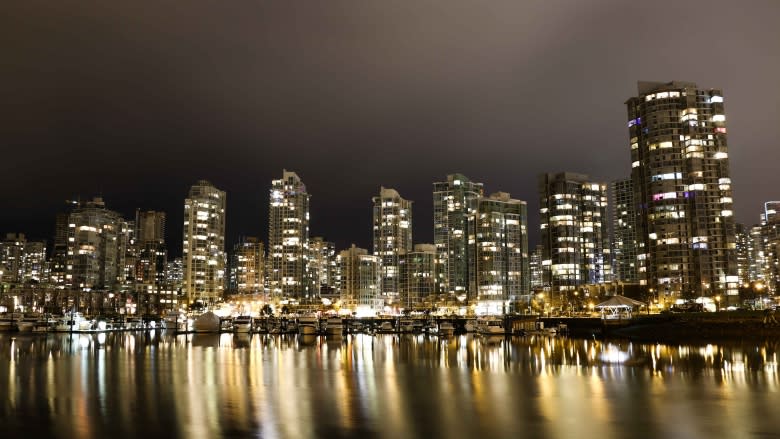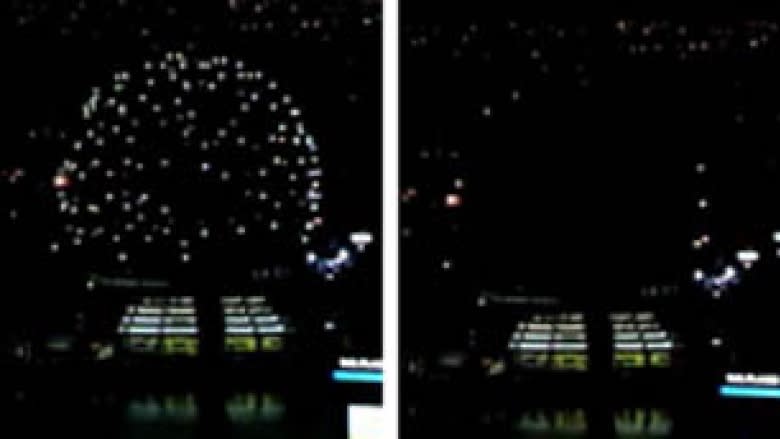Earth Hour energy savings wane in B.C., but WWF says event still relevant
B.C.'s electricity provider says participation in the annual dim your lights Earth Hour campaign is waning in the province, but the World Wildlife Fund — the non-profit organization that created the event — says BC Hydro's measure of who takes part is flawed.
Earth Hour, an event in which people around the world volunteer to turn off their lights and non-essential power, began in Sydney, Australia in 2007.
Philippe Devos, head of communications for World Wildlife Fund Canada, said it's a symbolic event aimed at spurring people to think about conservation and climate change.
Devos described the event as "an acknowledgement that we need to do better for planet earth."
The event has spread across the globe as a visual symbol of collective action to combat climate change due to greenhouse gas emissions.
Earth Hour begins Saturday at 8:30 p.m. in every time zone.
In 2008, when the event was first adopted by B.C. residents, BC Hydro began tracking the electricity saved during the event in communities across the province.
The utility says that year, the province achieved a two-per-cent savings in electricity usage, but by 2017 those savings dipped to 0.3 per cent.
BC Hydro tallies Earth Hour savings by comparing electricity use from the same hour from the previous week.
Not important in B.C.?
BC Hydro argues that participation is declining, according to its numbers.
"From a climate change perspective, Earth Hour seems to lack the gravity in B.C. that it carries in many other places around the world served by fossil fuel-generated electricity," said BC Hydro in a new study called Lights Out: Why Earth Hour is dimming in B.C.
BC Hydro says almost all power generation in B.C. is hydroelectric and only accounts for one per cent of greenhouse gas emissions. Forty per cent of greenhouse gas emissions are produced by commercial and personal transportation.
The WWF says the way hydro companies track electricity savings during Earth Hour is not an accurate measure of participation.
For example, over the event's 10-year history, Devos said many homes have moved toward using energy efficient light bulbs, which don't use as much electricity. So turning off those kind of bulbs doesn't save as much electricity as old, traditional light bulbs.
He said the best measurement of participation in Earth Hour is not necessarily for people to look at how much energy they consumed compared to the previous year. Rather, he said, a more effective gauge is to look at individual communities and see how dark they go.
The only way to measure that is to either walk through them during Earth Hour, or capture overhead images from drones or even satellites.
Devos argues that globally, more countries than ever are now participating — more than 180 — and that the event has helped create a global conversation around the problem of climate change.
For 2018, the WWF has shifted the focus of Earth Hour to ask participants to start discussing and acting on the loss of wildlife across the globe.
BC Hydro says in its report that the symbolism of Earth Hour is still important to British Columbians.
'Everything goes dark'
The Municipality of Whistler has championed the event since its inception.
Over the past decade, it usually comes out on top in the BC Hydro rankings of electricity savings, with consumers there saving around seven per cent.
"So it's very noticeable if you are out in the community that you're in the middle of Earth Hour because everything goes dark," said Mayor Nancy Wilhelm-Morden.
Wilhelm-Morden says the electricity savings are a motivator.
"That Whistler is at the top of the heap is a source of community pride and we certainly make our community members aware of that," she said.



